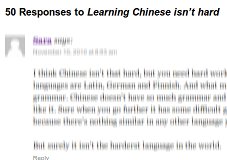The Chinese difficulty debate
Things have really kicked off at WooChinese. After John Biesnecker posted an article explaining why he believes learning Chinese isn’t hard, a long argument began in the comments. There was general disagreement with John’s point, which is understandable - learning Chinese is certainly an achievement to be proud of, and to be told it’s actually not that hard could be a bit of a blow.
Some of the criticism got quite vicious:
“So, just to keep score, you’ve called me full of bullshit, foolish, pretentious, and condescending… I think that’s enough for today, David. 贾君鹏,你妈叫你回家吃饭。”
However, I think a large bulk of the arguing was more of a disagreement on definitions (and there was much quoting of dictionaries). John’s point seems to be that ‘difficult’ and ‘requiring effort’ are not the same thing, and I agree with this.
On the whole I think it is true that so long as you put the time and effort in, your attempt to learn a language will be fruitful. It’s just a lot of time and a lot of effort.
This is not the same as something like maths or a science - you could spend hours trying to understand one small point and still not get it. There is a real element of difficulty, i.e. conceptual complexity, that isn’t present in language learning.
A good illustration of this, I think, is that children learn languages, and they learn them very well. I’m sure Chomsky would have something to say about why that is, but the point still stands: a young child can learn any language, but on the whole they cannot grasp advanced physics or maths.
Languages are conceptually easy, but require masses of material to be acquired. I think this is John’s point, and I tend to agree with it.

